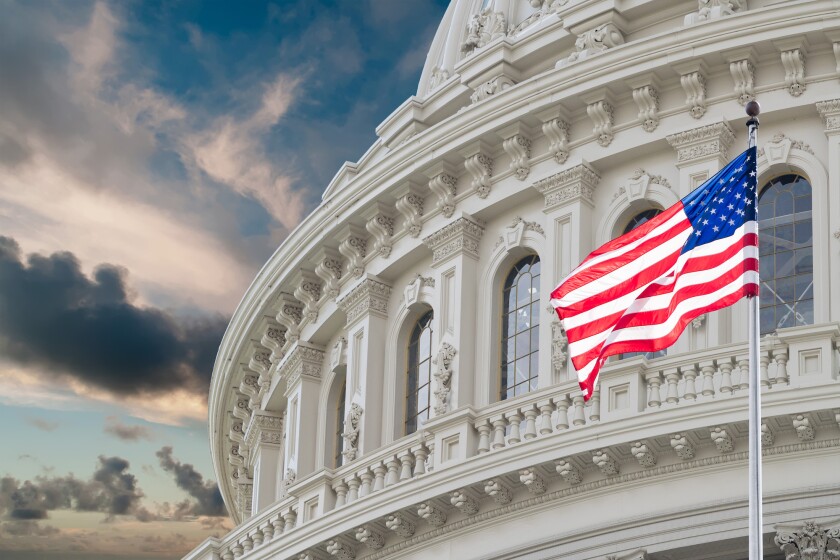Senators Joe Manchin and Chuck Schumer struck a deal on US minimum taxation on Wednesday, July 27, breaking the deadlock on long-debated parts of President Biden’s international tax agenda.
While Manchin opposed the Build Back Better bill two weeks ago, he agreed to its rewrite under the Inflation Reduction Act of 2022. It includes a corporate alternative minimum tax (CAMT) – the simplified US version of the OECD’s global tax rules.
The CAMT is technically a 15% tax on corporate profits in consolidated accounts, but it differs from the OECD global framework that requires taxation on a country-by-country basis. Advisers say that “the devil is in the details”, and it is unclear whether the OECD will accept the CAMT as part of pillar two.
The global intangible low-tax income (GILTI) rate is already a US minimum tax on foreign earnings, but it needs to coexist with the CAMT to better align with the OECD’s global framework.
Tax professionals say GILTI should be grandfathered as the OECD’s income inclusion rule (IIR), which applies a top-up tax when a foreign company pays below the minimum rate.
“GILTI changes are not part of the reconciliation package yet since Manchin only wants changes after the rest of the world has started implementing, so we are somewhat in the same position as before,” says Daniel Bunn, executive vice president of the Tax Foundation in Washington DC.
“If other countries implement the OECD’s model rules, then Biden’s proposal would be a significantly more burdensome policy for businesses than what other countries might adopt,” he adds.
The CAMT is levied after GILTI is applied and there are credits available to cover double taxation issues from pillar two implementations in other countries. When the CAMT liability is higher than the corporate income tax liability in the US under normal rules, the minimum tax will apply directly.
The CAMT allows worldwide blending of profits and taxes, which diverges from the OECD’s proposed framework. However, if the CAMT qualifies as an IIR under the OECD’s pillar two model rules, then it would protect US corporate profits from minimum taxes in other countries.
Regardless of the legislation’s details, Manchin's support is notable after he opposed tax provisions in the BBB bill earlier in July. The move appeared to torpedo any hope of passing legislation on pillar two.
The Manchin-Schumer deal must still pass a vote in the House of Representatives before going to Biden's desk, but the legislation stands a chance of becoming law as soon as August.
Prime minister leadership contest spells UK tax cuts
Both candidates in the Conservative leadership race for the next UK prime minister are pledging lower taxes but disagree on timing and details.
Former Chancellor Rishi Sunak has declared his plan to temporarily abolish VAT on household energy bills if he wins the election in September. This plan would cost the UK Treasury an estimated £4 billion ($4.8 billion) a year.
Meanwhile, his rival, Foreign Secretary Liz Truss, has pledged to reverse the tax increases Sunak presided over in government. However, the key difference is that Sunak has argued for tackling inflation before making tax cuts until now.
Truss has consistently argued tax cuts are the best way to boost economic growth – even if it means running a large deficit. She has pledged to scrap the plan to raise corporation tax from 19% to 25% by 2024 and reverse the national insurance increase of 1.25%.
Truss has also pledged to suspend the windfall tax passed to recover ‘excessive’ profits from the oil and gas industry. These changes would cost the Treasury more than £30 billion a year.
The Conservative leadership election has turned into a race over tax cuts, where both candidates are trying to persuade party members that their fiscal agenda will reap the most benefits.
Prime Minister Boris Johnson announced earlier this month that he would be resigning.
Pillar one 2024 start date under scrutiny
In other news, tax directors say the endorsement of pillar one could be jeopardised by the uncertainty around its two core elements – Amount A and B.
“Pillar one is complex, pillar two is much simpler,” said Ednaldo Silva, founder director and TP expert at online database company RoyaltyStat in Washington DC. “Both multinationals and tax administrations want certainty and pillar two brings that to the table.
“The big question is, you still need TP rules for the appropriate allocation of taxable income to jurisdiction,” he added.
The scope of pillar one and its complexities has meant that internal discussions within multinational enterprises (MNEs) are focused on the pillar two proposal.
Pillar one targets MNEs with total revenues exceeding €20 billion ($23.6 billion) – which means fewer companies will be affected by the rule than by pillar two. Pillar two will impose a 15% global minimum tax on multinationals with revenues over €750 million.
A head of tax at manufacturing company in Switzerland told ITR that corporations are still anticipating the likely effect of the OECD’s two-pillar solution on their operations, despite ongoing debates.
“Pillar two is where most companies are working on,” said the head of tax. “Pillar one is further away – the US has a big say and a lot of clarity is needed. Pillar one needs to be postponed; the date is not feasible.”
The 2024 deadline set by the OECD could be a difficult one to meet, after all.
Economic uncertainty increases competition for tax staff
As ITR reported this week, global economic uncertainty has made it difficult to keep key staff as competition for the best candidates has intensified between companies.
It follows concerns about a further economic downturn as businesses continue to reel from the COVID-19 pandemic and high inflation in the wake of the war in Ukraine.
These factors have hit the tax labour market with businesses reporting fierce competition to attract and retain talent.
Companies are being forced to re-evaluate staff pay levels to keep up with increasing market rates, while also offering greater career development opportunities.
Competition in the US appears to be particularly fierce with a reported shortage of tax talent compared to available roles. This supply glut seems especially acute in more strategic roles including tax data and technology.
A divide has also been observed between younger recruits who increasingly emphasise non-pay considerations such as cultural fit, job fulfilment, work-life balance and progression.
Tax directors have responded with a range of measures. These options include broadening employees’ job scope and skills development, as well as offering flexible work arrangements.
However, some tax professionals warn that greater responsibility and promotions will not be enough to keep staff if they are not accompanied by good management support and higher pay.
Read the full article here
Other ITR headlines this week include:
OECD pillars hold-up could jeopardise TP progress, say sources
India GST credits and audits causing company concern
Countries reluctant to make first move on minimum tax
Crypto tax framework on G20 docket for October
Investors turn to TTFs to gain treaty benefits
HMRC publishes TP draft legislation
Next week in ITR
The US semiconductor chip manufacturing sector is waiting for a windfall in R&D tax credits in August. ITR will be providing in-depth analysis of the R&D tax regime and its benefits for this industry.
Taxpayers have to get “back to basics” after the UK Upper Tribunal ruled against BlackRock over its TP arrangements. HMRC denied BlackRock interest deductions on the grounds that the company’s inter-company loans were not issued at arm’s length.
In other news, ITR looks at how multinational companies in Canada are dealing with greater uncertainty due to the increased scrutiny from the Canada Revenue Agency. This comes down to a little-known law requiring businesses to pay federal and provincial taxes on insurance premiums.
Readers can expect these stories and plenty more next week. Don’t miss out on the key developments. Sign up for a free trial to ITR.














